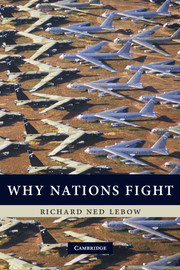7 - Conclusion
Published online by Cambridge University Press: 05 June 2012
Summary
Against war, it can be said that: it makes the victor stupid and the defeated malicious. In favour of war, it can be said that: through producing these two effects it barbarizes and therefore makes it more natural – it is the winter or hibernation time of culture; mankind emerges from it stronger for good and evil.
NietzscheI have analyzed war in terms of four generic motives – security, interest, standing and revenge – and a residual category of other. Other aside, where there are too few cases to chart any trends, the frequency of wars driven by interest and revenge has undergone the greatest decline relative to the frequency of war in general. This is attributable in the first instance to decline in the appeal and success of territorial conquest, until now a primary war aim of interest-driven wars. Wars of revenge are less frequent for the same reason: historically, their principal objective was regaining territory lost in previous wars. Standing and security show an absolute, but not a relative, decline, which I attribute to a combination of material and ideational causes. In Chapters 5 and 6, I advanced this argument with respect to individual motives and used it as the foundation for forecasts about the likelihood of my four principal kinds of wars. In the present chapter, I explore the relationship between material and ideational conditions across categories and use this exercise to probe some of the deeper causes for the decline of war in the nineteenth and twentieth centuries.
- Type
- Chapter
- Information
- Why Nations FightPast and Future Motives for War, pp. 197 - 226Publisher: Cambridge University PressPrint publication year: 2010



